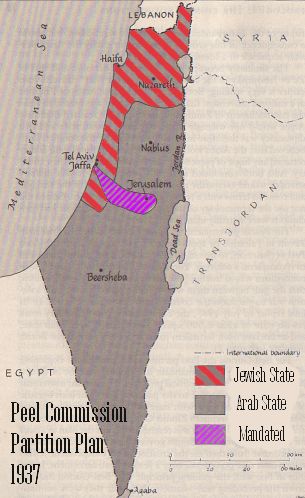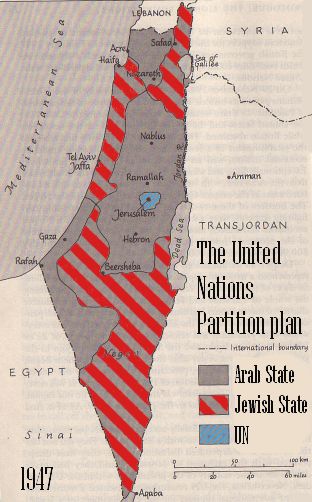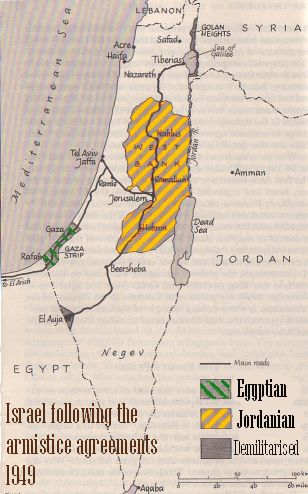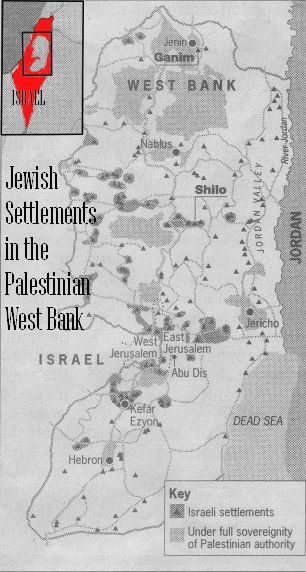 |
|
| THE HANDSTAND | MARCH/APRIL 2002 |
A History of Palestine in Maps The plight
of the Palestinians has been a major tragedy in recent
world history. It can be shown that during the course of
the last Century the Palestinian people have been
excluded from Statehood and systematically robbed of
their land. A major
misconception has been propagated that Palestinians have
no history and therefore did not really exist before the
foundation of the Jewish State. This is quite clearly a
falsehood, because, at the time of the Balfour
Declaration, which agreed with the principle of a Zionist
State, the Jewish population numbered only 56,000 against
an Arab population of 600,000. Any denial of this is a
manipulation of demographic facts. In l937, in response to rising Arab
nationalism, the British Government set up the Peel
Commission to deal with the Jewish question in Palestine.
The outcome was a plan to partition the region into a
large Arab State and a small Jewish State, retaining a
British mandate in Jerusalem. The Zionists were
particularly unhappy with this plan because it
demonstrated their minority status and frustrated the
expansionist mentality. After the Jewish Holocaust there was a greater international recognition of the rights of the Jews to their own State. In 1947 the General Assembly of the United Nations passed Resolution 181, which was the first stage in the legitimisation of Israel. The l947 U.N. resolution on Palestine was not concerned with the partition of a country along old Colonial borders, as was the case in Africa and Latin America. Resolution 181 set out to divide a multi-ethnic mixed region using arbitrary borders. In many ways this was a precedent for the division of Yugoslavia which occurred more recently. Under the U.N. plan Israel was ceded a much larger area than under the previous Peel Plan. This territorial expansion was completely unacceptable to the Arabs, who resisted the new status quo. The outcome was the 1948 Arab/Israel War, which resulted in calamity for the Palestinians, defeated by Israel. After this war of independence the Israelis expanded their territory from 55% of the mandatory Palestine allocated by the U.N. to a stunning 79%. The armistice agreements of 1949 with neighbouring Arab countries confirmed this arrangement for years to come. The remaining Palestinian territories were controlled by these neighbouring countries, which each had their own territorial ambitions. Jordan occupied the West Bank and Egypt the Gaza Strip. Demilitarised zones were set up in contested areas bordering Syria.
The
Israelis used the Arab Israel War as a means to solve
their own demographic problem, to effectively exclude
Palestinians from their land. Within the newly formed
State there were only 92,000 Arabs opposed 716,000 Jews.
700.000 Palestinian refugees were forced to flee their
homes and spend the rest of their lives in camps in
Lebanon, Jordan, West Bank and Gaza Strip. For the
Israelis the war achieved a major objective, the
expansion of Israel and the exclusion of Palestinians.
For Israel this was an ideal conclusion to the problem of
co-existence, but unfortunately for them things did not
stop there !! The main
fault in Israeli policy was that they did not promote an
autonomous Palestinian State. Successive Governments
denied the Rights of Palestinians to return to their
homes or to receive compensation. No accommodation
between the two sides was sought and Israel aggressively
pursued its own policy of national self-interest, with
complete disregard for Arab neighbours. This strategy
culminated in the Six Days War in 1967 with Israel’s
annexation of the Gaza Strip, West Bank, Sinai and the
Golan Heights. This expansion of the Jewish State meant a
re-integration of 1,250,000 Palestinian people back into
Israel without any substantive change in their living
standards. A further UN resolution (242) embraced the
principle that Israel should withdraw from territories
occupied during the 1967 war and countries should live in
peace within secure boundaries. Despite this ruling
and further diplomatic efforts supported by external
powers Israel did not make any substantive effort to
withdraw from Palestinian land. Golda Mier, who was the
Israeli leader 1969-1974, refused to acknowledge the
rights of the Palestinians to national self-determination.
The Palestinians became effectively second-class citizens
and the problem of co-existence once again became a major
factor and source of conflict. In 1973 Moshe Dayan
(hawkish defence minister at time of 1967 war), advocated
Jewish expansion into the occupied territories. The
policy which was adopted was not to explore peace with
the Palestinians but to draw a new map for Israel,
creating realities on the ground that could not be
altered in times to come. It is my opinion that the suffering
of the Jews in the Holocaust does not justify a further
injustice on their part. The Jews should pull back from
the brink and withdraw their settlements from the
occupied territories. It is fallacious to regard
the promise of a Palestinian State in the Oslo Accords of
the 1990s as a fair deal. Under the agreement the
Palestinians were only offered 18 per cent of the west
Bank and 60 per cent of Gaza. Since then the Israeli
government has consistently failed to fulfil their part
of the agreement and there has been an increase in the
construction of settlements in the West Bank in
contravention of the 4th Geneva Convention.
Since Ariel Sharon became president, Israel has built 34
new settlements in the occupied territories. In fact the
Palestinians are paying a high price for the Oslo
agreement, because they were given various bits of land,
lacking any demographic coherence. The Jewish
settlements are located in such a manner as to
strategically split the Palestinian territory and
reinforce Israeli military control over the region. As
Israel also controls the economic resources of the
region, the Palestinians are relegated to a position of
subservience to Israel. Nothing less than a return to the
pre-1967 borders is an acceptable solution. It
should also be recognised that Palestinian refugees have
a valid right to compensation for the loss of homes and
property which has been their lot under Jewish occupation. |
|
| © Rory Braddell | |



